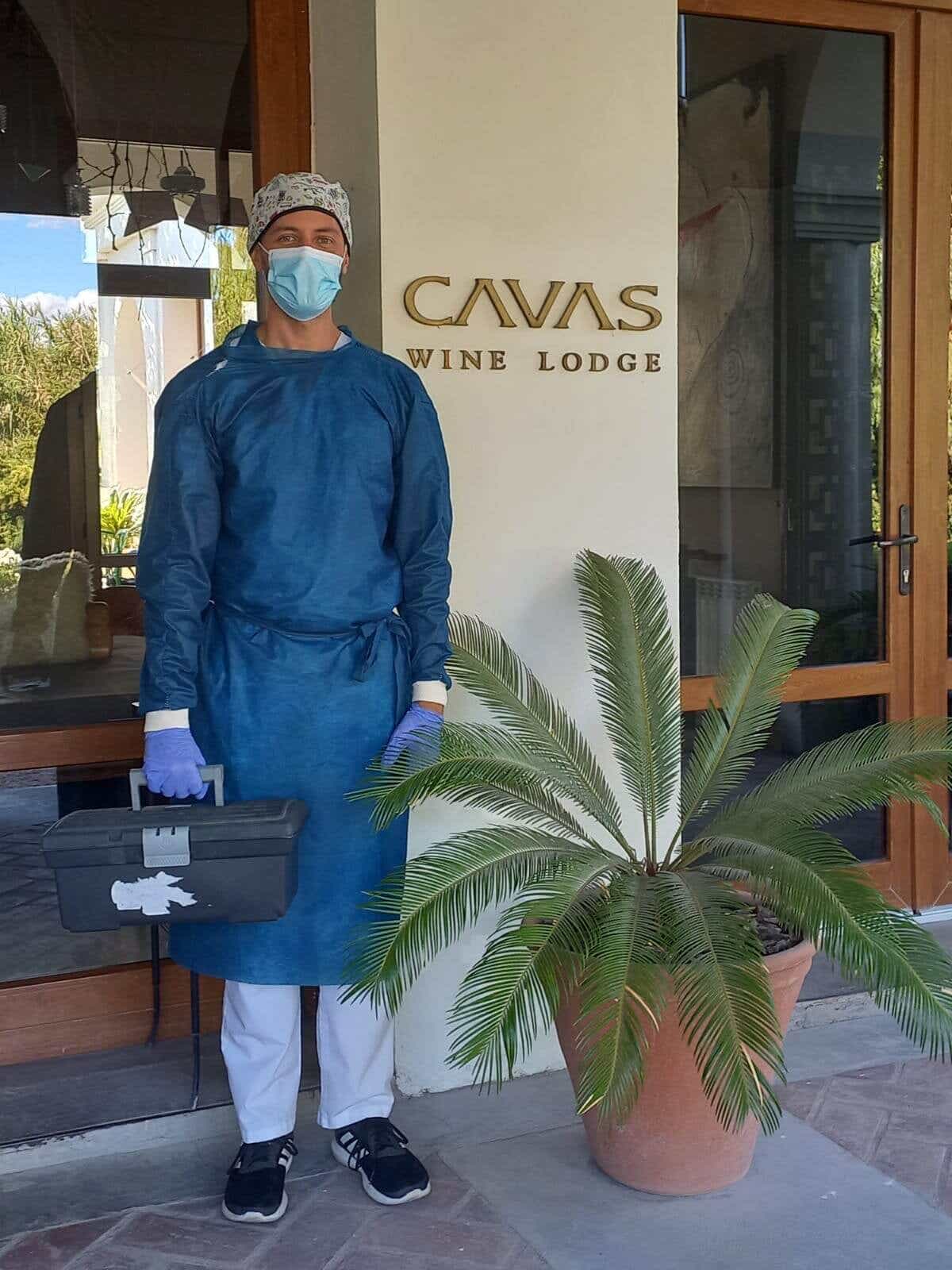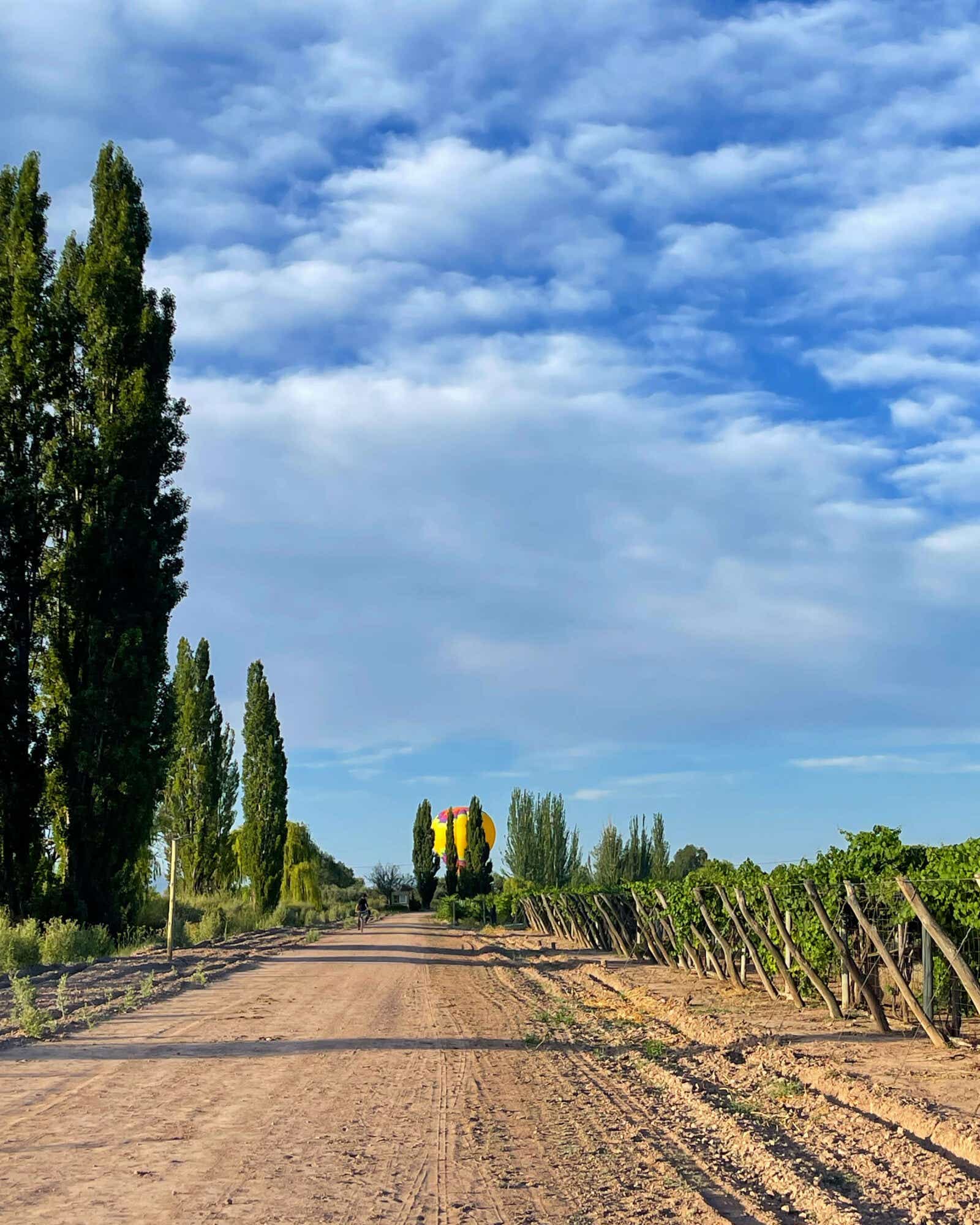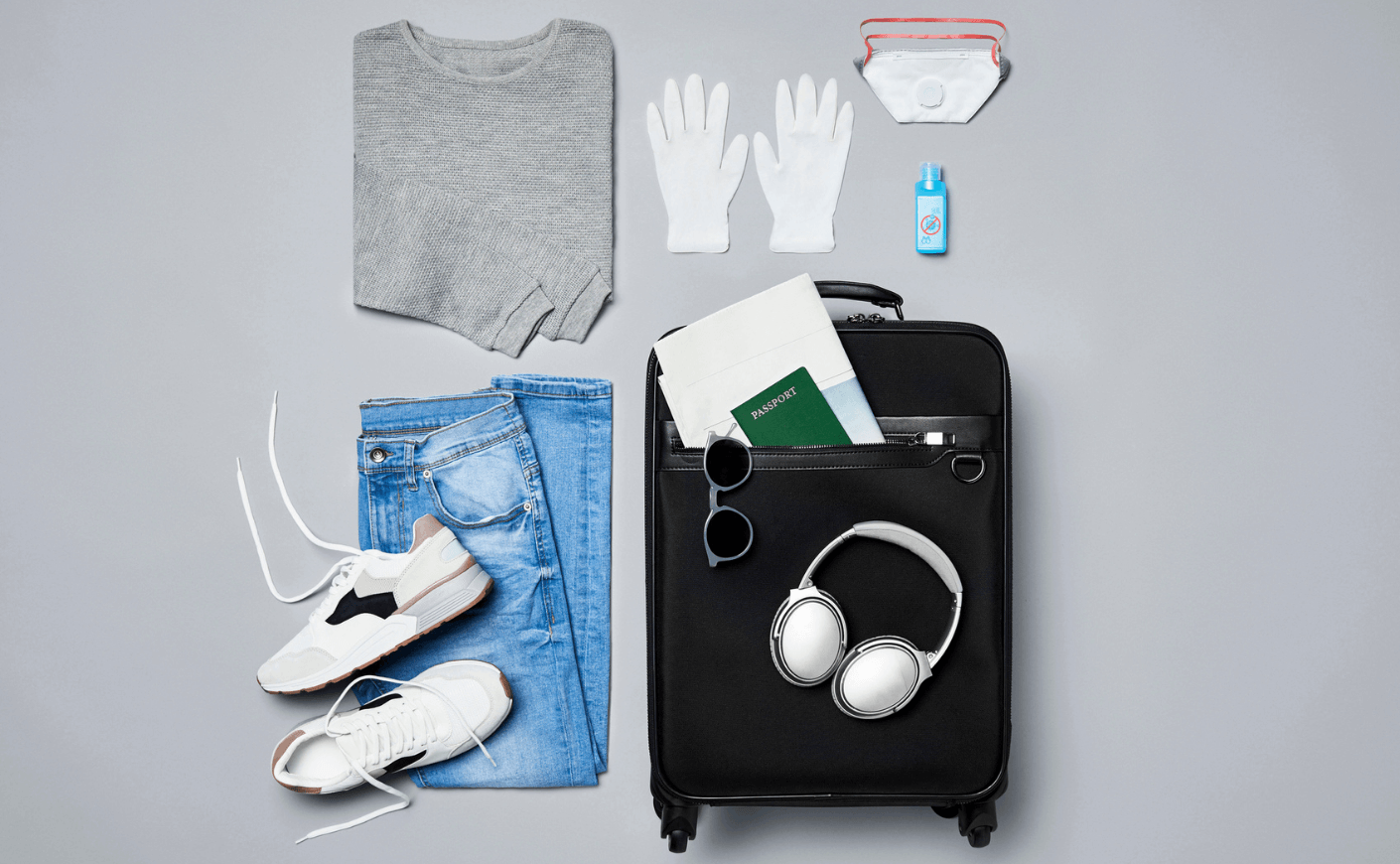New Year’s Eve day used to be one of my favorites: I’d usually drink wine at lunch and toast to “out with the old!” But when I woke up with a headache on the last day of 2021, six thousand miles from home, I lay in bed long enough for my roommate to leave for breakfast before sneaking a Covid test, the responsible thing to do since I was traveling with three friends in Argentina. I wanted to reassure them I was negative. The thought of my being positive fluttered through my mind, but having been triple Pfizer-vaxxed, it felt inconceivable and I felt invincible; that virus didn’t stand a chance inside my system. Or so I thought.
Watching the double pink line develop on the test was like a nightmare in daylight. I truly could not comprehend what was happening on that little card, so I took a photo and sent it to a friend in New York on WhatsApp. No answer. I read the instructions again and again: “Even if there is a faint double line, it’s positive.”
Once aware of my self-test, the hotel sent a guy in a hazmat suit to my outdoor patio to do a PCR test, which confirmed the positive antigen test. The result was then sent to some official government office to keep on record and, who knows, maybe monitor my exit. The hazmat guy (we’re now on a first name basis and his is Nicolas) returned a week later for another test, also positive. And so, I’m still in Argentina.

While isolating unexpectedly in another hemisphere for 10 days, I’ve become somewhat of an expert in getting Covid far from home. There are things I didn’t think about before I left, and wish I had. So in the spirit of sharing, if you choose to travel internationally and assume you won’t get Covid, here’s what I’ve learned. It could help save your vacation, your friendships, or even you.
When it Comes to Covid, it’s Every Person for Themselves
Once I texted my friends at breakfast my self-test result photo, there was a long text silence. They were busy making decisions — without me. One told me to start looking for an Airbnb in Mendoza. Luckily, I didn’t have to as my hotel delivered spray bottles of alcohol and let me isolate on premises. (Check to see if your destination country keeps positive travelers in a government hospital or hotel instead.) My roommate was swiftly given her own room, and booked an immediate return to the U.S.
Our previous jokes about how we would all stay in Argentina for a month if one of us picked up “The ‘Vid” went straight out the proverbial airplane window. My friends subsequently sent me photos of their vineyard lunches and bike rides, kindly stopped by on New Year’s Eve to drop off a cheese plate, and still text me daily to check on my health since they’ve left the property. But the truth is, you need to isolate entirely alone — that’s what “isolate” means.
I get it. Everyone needs to take care of themselves — their main concern was and is staying Covid-free, as it should be. But if you’re the one with Covid, know this: As soon as you get the result, you’re on your own.
Think about your friends, family, or partner traveling with you. What would they do if you get Covid? What would you want them to do? Hang out in (and pay for) an extra room while you isolate? They may also need to quarantine since they were exposed to you. Or what if they stay and then get Covid as your isolation period is ending? Have the conversation before you hit the road. And be prepared to spend some time alone if it happens. Are you OK with that?
Imagine the Worst, Then Plan for It
Here’s one thing I never did before leaving for this trip: imagine what would happen if I got Covid while in Argentina. Seems simple enough, after all Omicron was spiking daily and it was a real possibility. But I never actually thought it through. Sure, before I left, I threw in a couple of extra weeks’ worth of estrogen patches and some Zinc tablets for immunity as “insurance.” But I didn’t take any Tylenol, Sudafed, or Mucinex (all of which would be helpful for Omicron symptoms), or an oximeter and a thermometer, which were recommended last year, or even PJ bottoms or enough underwear for two weeks. In other words, my packing was lackluster for the scheduled 10 days, never mind three weeks.
I have travel insurance for healthcare (go to TravelSafe.com to learn more and get yours), but I didn’t read the policy thoroughly; I bought it the day before I left because the Argentina entry affidavit requires it, as well as a letter stating that the insurance covers Covid health treatment costs. I didn’t know if it would cover staying in a hotel for the isolation period — or changing my airline ticket home when there are thousands of flights being canceled and new flights are triple the cost. The cell service in Mendoza is spotty, and I was relying on WhatsApp or FaceTime, neither of which my insurance company uses. Their email inbox is flooded with claims.
Take the time to research what it means to get COVID in your destination country, including following their isolation rules, not those of the U.S. The isolation period in Argentina is seven days but prohibits gathering for 10 — and a flight is considered a gathering in air. (It doesn’t matter that the U.S. isolation is five days when you’re not in the U.S.)
Think through your decision, pack more than you think you’ll need (including rapid antigen kits), and get a travel insurance policy that covers that country’s requirements. Also, know the new U.S. CDC rules for re-entry as of December 27, which include a negative PCR or antigen test the day before you fly, supervised by a professional or a letter from a healthcare official in that country stating you have served their isolation period, yet still test positive. In Argentina that would be on Day 11. (I tested positive on Day 4 of my planned trip, so adding 11 = 15 days anyway.) Plus, you’ll need to sign an Attestation Form stating your vaccinations. There are different rules for the unvaxxed, including quarantine time.
Pay Attention to the Early Signs
On my third day of symptoms (head cold, sore throat, exhaustion, hives on my feet), I took a nap and then checked my OURA ring app, which records my biometric data, to monitor my deep sleep. I realized OURA had been forecasting my Covid for a few days; my heart rate and body temperature had been elevated, which led to a drastically low “Readiness Score” of 47, the likes of which I had never seen before. Elevated body temp and heart rate signal that you’re fighting an infection. I was also sleeping more than usual (and snoring according to my roommate!). My body was dealing with this virus before I realized it. The earlier you find out, the better for protecting others, so watch your vitals.
Don’t Be Afraid to Speak Up When Someone Isn’t Following the Rules
On my flight from NYC to Buenos Aires, my three friends were in Business Class and I was in Coach, but I had the whole row to myself. Even the row behind me was empty, till a family of three moved into it. The young child of the family didn’t wear his mask some of the time, and my passive-aggressive dirty looks were not enough to persuade him to put it on. I glared at the flight attendant over my KN95, begging him to ask the parents of the child to cover his mouth. But I didn’t actually say anything. I’d been admonished once before on a plane for asking someone to wear a mask, and that experience was confrontational and ugly. So I couldn’t bring myself to ask the flight attendant to enforce the rule. I wish I had.On a plane it’s the rule to wear a mask, no debate, so say something to the flight attendant if need be.
Remember that in another country, waiters, taxi drivers, and people on the street may not have access to vaccines or follow mask-wearing as diligently as they do where you’re from. I wish I had kept my mask on when I walked to a botanical garden for exercise, and not eaten at any restaurants, despite them being outdoors.
Weigh the Risks
Was this trip necessary? A special anniversary or birthday or wedding or business obligation I had to attend? Absolutely not. Ask yourself: What’s necessary for you to risk a trip? Dealing with Covid abroad isn’t just about inconvenience: It’s about spreading it to others who are vulnerable. I was terrified that I had caught Covid before I left Boston, where I spent the holidays with my 88-year old parents and my boyfriend. Or that I had given it to my travel companions, or to my Argentine friend we had dinner with the night before I tested positive. So far, they’re all fine and I’m relieved. But ask yourself before you go: Is your trip worth possibly spreading Covid to a person you love or even one you don’t know?
And no matter what, it’s going to cost money to change plans, stay for extra time, and be out of your normal working life. Get very used to that idea.
There Is No Shame in Covid — If You Follow the Rules
Do we judge someone when they get a cold or flu? Maybe one good thing to come out of the Omicron surge is the acceptance that Covid isn’t actually so “novel” anymore. Hopefully we’re each boosted enough for our bodies to dispense of it. If you are an avid KN95-wearer, triple vaxxed, respect the mask rules, and self-sanitize constantly, who’s to judge? My medium-sized cold symptoms and weird itchy hives on my feet are manageable. I don’t mind telling you I have Covid because I followed the rules and got it anyway. (If you won’t get vaccinated to help put this virus to rest among the global population, that’s another story completely.)
Give in to the Universe
Let’s get real here. I’m in Mendoza in the magical Cavas Wine Lodge. I’m The Covid Patient in a casita tucked in the middle of 55 acres of Malbec vines with a view of the Andes. It’s summer in Argentina. I have a plunge pool and a patio, the croissants are delicious (I can still taste and smell!) and I was coming here on vacation anyway. Everyone at the hotel is lovely. I’ve seen no one except the server, who drops off breakfast and a salad at night, the super kind staff who is helping me rearrange my trip from a very far distance, and Nicolas, the Covid tester. I have WiFi; I’m working and Zooming yoga and texting with my parents and friends, who have been amazing. I am not complaining.
I spent the first five days of isolation reading everything possible about the rules and regs of Argentina and the U.S. CDC guidelines I’d never seen before. Last night I overheard someone from another casita through the vines and the only line I picked up was, “Everything happens for a reason.” We’ve all heard it before but sometimes you hear the exact right thing at the exact right time. Vacations are usually about racing around and seeing, doing, touring, eating, and drinking everything in sight. This incident has forced me to slow way, way down, and stay in one amazing place. To look around and appreciate this precious minute in this leafy, secluded vineyard, with the baby fox and resident kitty Simona who visit my patio, and the doves and sparrows who enjoy my daily croissant as much as I do.
My next Covid test is tomorrow night, and I’m not sure what the result will be, but either way, I’ve decided to happily stay in Mendoza. Actually, I have no choice.

Follow Martha on Instagram @marthamccully









